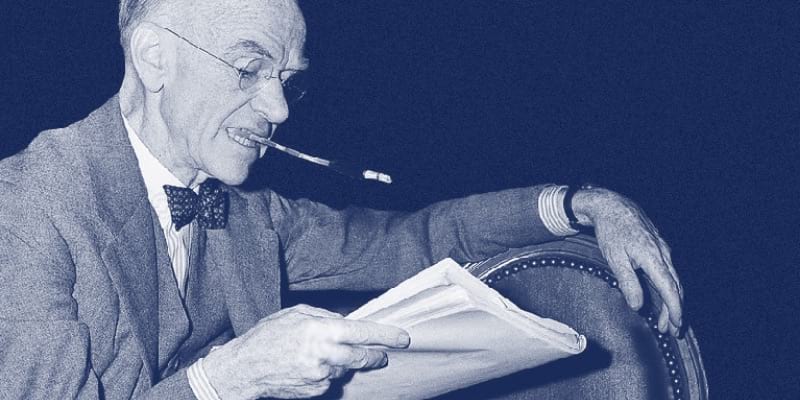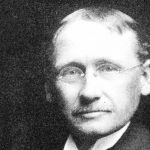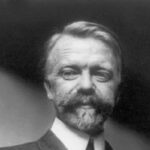Elton Mayo biography and studies

Elton Mayo (1880 – 1949) was an Australian psychologist, an industrial researcher and an academic organizational management scientist. His conducted studies, together with the Hawthorne studies, became the base for his lifelong breaking theories on Human Relations Theory of Management and scientific management.
Elton Mayo biography
After attending several schools in Australia without finishing, Elton Mayo started his study in philosophy and psychology in 1907 at the University of Adelaide.
There he graduated with honours in 1910 (B.A.) and also won the Roby Fletcher prize in psychology. After that, he also got his masters degree (M.A.) in 1926.
After graduation, Elton Mayo stayed connected to the scientific world and became a foundation lecturer in philosophy in 1911 at the new University of Queensland.
Between 1919 and 1923 Elton Mayo held the first chair of philosophy. After 1923 his focus shifted to industrial research and he became professor at the Harvard Business School.
Hawthorne studies
His first ground breaking research involved workers that worked at a textile mill. The high rate of turnover had a big influence on their mental abnormalities. Elton Mayo helped them through the introduction of rest periods which led to great results and recognition.
This was the foundation for the human relations theory and his book The Human Problems of an Industrialized Civilization (1933).
His research between the 1920’s and 1930’s showed the importance of groups in affecting the behavior of individuals at work. His principles and ground rules are still repeatedly used today in numerous of “how” books on leadership, management and mentoring.
Elton Mayo continued his research and lectures as a professor of industrial research and stayed connected to the Harvard Business School until 1947.
When he retired in 1947, he moved to the United Kingdom. Elton Mayo died in 1949 due to the effects of excessive smoking and suffering from chronic hypertension.
Famous quotes
- “What social and industrial research has not sufficiently realized as yet is that… minor irrationalities of the “average normal” person are cumulative in their effect. They may not cause “breakdown” in the individual but they do cause “breakdown” in the industry.”
- “Defeat takes the form of ultimate disillusion — a disgust with the futility of endless pursuit.”
- “The problem is not that of the sickness of an acquisitive society; it is that of the acquisitiveness of a sick society.”
- “If our social skills (that is, our ability to secure co-operation between people) had advanced step by step with our technical skills, there would not have been another European War.”
- “Management, in any continuously successful plant, is not related to single workers but always to working groups. In every department that continues to operate, the workers have whether aware of it or not formed themselves into a group with appropriate customs, duties, routines, even rituals ; and management succeeds (or fails) in proportion as it is accepted without reservation by the group as authority and leader.”
- “One friend, one person who is truly understanding, who takes the trouble to listen to us as we consider our problem, can change our whole outlook on the world.”
- “We have in fact passed beyond that stage of human organization in which effective communication and collaboration were secured by established routines of relationship.”
Publications and books by Elton Mayo et al.
- 2013, 1972. Psychology of Pierre Janet. Greenwood Press.
- 2003, 1933. The Human Problems of an Industrial Civilization. Routledge.
- 1949. Hawthorne and the western electric company. Public Administration: Concepts and Cases, 149-158.
- 1948. Some notes on the psychology of Pierre Janet.
- 1947. The political problem of industrial civilization.
- 1946. Human problems of an individual civilization. Boston: Division of Research, Graduate School of Business Administration, Harvard University, 187.
- 1945. The Social Problems of an Industrial Civilization. Harvard University, Division of research, Graduate School of business administration.
- 1944. Teamwork and labor turnover in the aircraft industry of Southern California. Harvard University Graduate School of Business Administration Publication.
- 1939. Management and the Worker.
- 1939. Routine interaction and the problem of collaboration. American Sociological Review, 4(3), 335-340.
- 1937. Psychiatry and sociology in relation to social disorganization. American Journal of Sociology, 42(6), 825-831.
- 1930. The human effect of mechanization. The American Economic Review, 20(1), 156-176.
- 1930. Changing methods in industry. Personnel journal.
- 1930. The Hawthorne Experiment. The Human Factor, 6.
- 1930. A new approach to industrial relations. Boston: Division of Research, Graduate School of Business Administration, Harvard University.
- 1925. Day dreaming and output in a spinning mill. Journal of the National Institute of Industrial Psychology, 2(5), 203-209.
- 1924. Recovery and industrial fatigue. The Journal of Personnel Research, 3, 273-281.
- 1923. The irrational factor in human behavior: the” night-mind” in industry. The Annals of the American Academy of Political and Social Science, 110(1), 117-130.
- 1922. Industrial peace and psychological research. Industrial Australian Mining Standard, 5, 16.
- 1920. The Australian political consciousness. Australia: Economic and political studies, 127-44.
- 1919. Democracy and freedom. Macmillan & co., ltd.
How to cite this article:
van Vliet, V. (2017). Elton Mayo. Retrieved [insert date] from Toolshero: https://www.toolshero.com/toolsheroes/elton-mayo/
Original publication date: 06/15/2017 | Last update: 08/20/2023
Add a link to this page on your website:
<a href=” https://www.toolshero.com/toolsheroes/elton-mayo/”>Toolshero: Elton Mayo</a>











